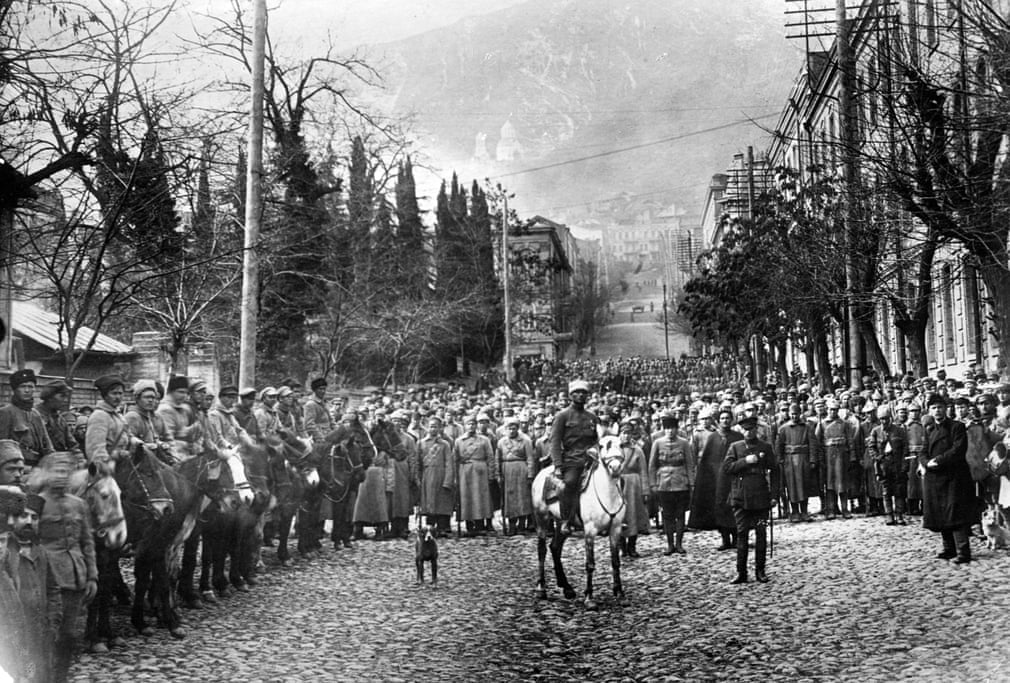Georgian Émigré Recollects Soviet Occupation of Tbilisi before US Congress in 1954
Today on February 25, Georgia marks 99th anniversary since Soviet Russia occupied Tbilisi, the capital of the Democratic Republic of Georgia. To mark this day, we bring here the excerpt from the testimony given by Alexandre Tsomaia (Tzomaia), former Georgian national, before the Congress in October 1954, in which he recollects Soviet takeover of Georgian capital. Tsomaia, Georgia-native from Kutaisi, fought against the Soviet occupation of his country in early 1920s. He first emigrated to France and Germany after the Soviets crushed anti-communist August-September 1924 uprising of Georgians. Later, following WWII, Tsomaia moved to the U.S.
Subcommittee of the House Select Committee
To Investigate Communist Aggression
And the Forced Incorporation
Of the Baltic States into the USSR
New York, N.Y.
The committee met, pursuant to adjournment, at 11:10 a.m., in room 36, United States Courthouse, Foley Square, New York, N.Y., Hon N. A. Feighan, member and T. M. Machrowicz.
Also present: James J. McTigue, committee counsel.
…..
Mr. MCTIGUE. The next witness, Mr. Chairman, is Mr. Tzomaia.
Mr. FEIGHAN. Will you state your name, please?
Mr. TZOMAIA. Alexander Tzomaia.
Mr. FEIGHAN. Will you raise your right hand? Do you solemnly swear that the testimony you are about to give will be the truth, the whole truth, and nothing but the truth, so help you God?
Mr. TZOMAIA. I do.
TESTIMONY OF ALEXANDER TZOMAIA, THROUGH THE INTERPRETER, NICHOLAS KAY
Mr. MCTIGUE: Where are you presently residing, Mr. Tzomaia?
Mr. TZOMAIA. In New York.
Mr. MCTIGUE. What is your address?
Mr. TZOMAIA. 1335 Madison Avenue, New York City.
Mr. MCTIGUE. In what capacity are you employed at the present time?
Mr. TZOMAIA. I am employed as a factory worker.
Mr. MCTIGUE. In New York City?
Mr. TZOMAIA. In New York City.
Mr. MCTIGUE. Where were you born, Mr. Tzomaia, and when?
Mr. TZOMAIA. I was born in the town of Kutaisi, in 1907.
Mr. MCTIGUE. Is Tiflis a city in Georgia?
Mr. TZOMAIA. Yes. Tiflis is the Russia form of the Georgian word Tblisi*. The Georgian word is Tblisi, which means warm spring, but the Russians changed it to Tiflis, and that has been accepted in Europe and evewyehere else.
Mr. MCTIGUE. And that is the name by which it is known now; is that correct?
Mr. TZOMAIA. No; it is Tblisi. It is known as Tblisi now.
Mr. MCTIGUE. Well, at the time it was known as Tiflis before the Russians changed the name; is that correct?
Mr. TZOMAIA. No, sir, it was known as Tblisi, and then after the Russian occupation it was known as Tiflis, but then it was changed back again to Tblisi.
Mr. MCTIGUE. When you were in Georgia, were you living in the city of Tiflis?
Mr. TZOMAIA. Yes.
Mr. MCTIGUE. And its name has since been changed to Tblisi?
Mr. TZOMAIA. Yes.
Mr. MCTIGUE. How do you spell that?
Mr. TZOMAIA. T-b-l-i-s-i.
Mr. MCTIGUE. For the purposes of identification, suppose we refer to this city by its original name, Tblisi.
Mr. TZOMAIA. That is as it should be.
Mr.MCTIGUE. At the time you were living in Tblisi, which we will use for the purposes of this examination, was the city occupied by the Russians?
Mr. TZOMAIA. Yes.
Mr. MCTIGUE. When?
Mr. TZOMAIA. February 1921.
Mr. MCTIGUE. What happened at that time? You were living there, the Russians occupied the city. Will you tell us something about it?
Mr TZOMAIA: Yes. The Russian troops occupied Tblisi on the 25th of February 1921. The majority of the population left the town together with the retreating Georgian troops. However, many were compelled to remain. Myself and my family were among those. And I witnessed the entry of Russian troops in Tblisi.
It surprised me to see that although they were extremely well armed, they gave the impression of being sort of bandits more than regular army. They were dirty, unshaven, unkempt, and they behaved just like bandits would behave.
The first thing they did, they started to loot the town. Tblisi escaped the ravages of the Russian revolution and was about the only town untouched by the revolution up to that time. There were good shops, plenty of stuff in them, such as food and clothing.
The Russians began immediately looting. After all the shops were looted they started on private houses. For instance, they came into our house and looted it of absolutely everything they could carry away with them. Also there were many cases, of course, as is common among the Communists, of women being molested.
*Note by Civil.ge/Republic-100 editor: Tbilisi is commonly misspelled as Tblisi by many English-speakers.
